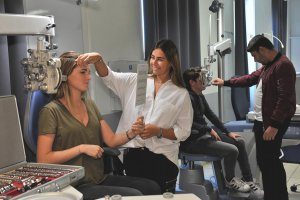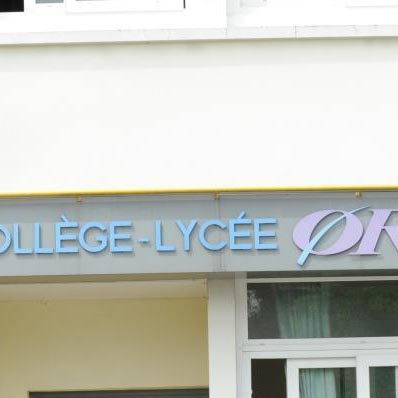Vicious attacks on two Jewish children in the Paris suburb of Sarcelles have reinforced the image of a community under siege – but Moise Tibi, Principal of the ORT school in neighbouring Villiers-le-Bel, insists that the situation is much better than the media reports make out.

“I feel very safe,” says ORT Villiers-le-Bel Principal Moise Tibi.
This week’s assault on an eight-year-old boy wearing a kippa came two weeks after a 15-year-old Jewish girl was slashed in the face. France’s President, Emmanuel Macron, and Interior Minister, Gerard Collomb, condemned the incident.
Mr Tibi said the welcome statements of support from national leaders was a sign of the authorities’ determination that Sarcelles would not be allowed to revert to the conditions of four years ago when it was the scene of anti-Jewish riots.
“There’s good harmony between religions in Sarcelles now,” he said. “People say that this child’s attackers had come in from another area. The children in my school are happy; they are not afraid.”
The school has employed tighter security since the terrorist attacks of 2015, one of whose victims was an alumnus – but so have all schools, Jewish and non-Jewish.
“I also advise the students not to wear a kippa when travelling to and from school,” Mr Tibi said. “And we have a security guard who accompanies the children between the school and the train station. But that’s mainly to reassure the parents – nothing has ever happened.”
There is, however, an issue with street crime, particularly cell phone robberies. Maths teacher Dan Sarfati became a victim outside the school last year and a student who refused to hand his phone over was badly beaten in front of his eyes.

Students at ORT Villiers-le-Bel are happy and confident.
“I don’t feel very safe. But I’m the only teacher who’s been attacked so I may be more sensitive about it than others,” Mr Sarfati said, adding that nothing had been said or done to indicate that what happened to him and the student was a hate crime.
“I feel very safe,” countered Mr Tibi, “even though this area is officially classified as an Education Priority Zone, which means there are many social issues.”
Notably, the high rates of aliyah which followed the 2015 terrorist attack have dropped markedly.
“At some schools up to 30 per cent of their students were leaving for Israel, although at ORT it was only three per cent. Now it’s stopped,” Mr Tibi said.
There is still a strong connection to Israel but ORT alumni who do go there are motivated by what the Jewish State has to offer rather than problems they encounter in France.
Mr Sarfati noted that one-third of his class made aliyah last year – but only after matriculating.
“Most went because they wanted to study at the Technion but some also because they wanted to serve in the army,” Mr Sarfati said. “They have a feeling for Israel.”

ORT Villiers-le-Bel offers a range of post-matriculation degree courses which provide pathways to good careers.
That students wait until they have completed their final baccalauréat exam says a lot about the level of education they receive at ORT.
Mr Tibi: “ORT has an important social role. This is a poor area. Our school provides a good education with good results. It’s also affordable; and we make efforts to reduce the costs for children of poor families. We don’t want anyone to be in a position where they feel they can’t take up a place here because of money.”





